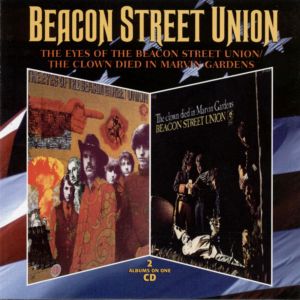
- Format: MP3

The Eyes of the Beacon Street Union (1968)
The Eyes of the Beacon Street Union is a highly experimental album released around the time of the Bosstown sound. Much better than first albums from Eden's Children and Ultimate Spinach, the disc, however, lacks direction — and cohesion. Vocalist John Lincoln Wright has the same look that he sports 23 years later on his 1991 Honky Tonk Verite CD, including his trademark cowboy hat, but the similarities between these two albums stop there. The Eyes of the Beacon Street Union is garage rock and psychedelia, and it is a trip. Where Orpheus opted for the serious pop of "Can't Find the Time," producer Wes Farrell includes a recitation by the late Tom Wilson, producer of The Velvet Underground & Nico, acting very avant-garde: "Look into the gray/look past the living streets of Boston/look finally into the eyes of Beacon Street Union." Well, Wilson did a decent job with the V.U., but he's no Crazy World of Arthur Brown screaming the immortal line "I am the god of hellfire." The band immediately dips into "My Love Is." resplendent in Robert Rhodes' (aka music attorney Robert Rosenblatt) best ? & the Mysterians keyboard sound, very cool '60s backing vocals, and guitars that are straight from the Psych Out film soundtrack. In fact, this song would have fit perfectly on that album along with the Seeds and Strawberry Alarm Clock. Had Wes Farrell kept the band on this track, the album might have more collectability. "Beautiful Delilah" is too novel to keep the momentum going, and "Sportin' Life" is lounge blues. Side two fares a bit better; "Speed Kills" and "Blue Avenue" are classic '60s psychedelia, a far cry from John Lincoln Wright's Sour Mash Boys, and amazing that it is the legendary Massachusetts country artist singing. "South End Incident" refers to the South End of Boston, which has become quite trendy, but in the day Jonathan Richman, Moe Tucker of the Velvet Underground, and George Thorogood would play that part of town — on the same bill! The music to the song might be an old blues riff, but the body of the work is "Heartbreaker" by Grand Funk Railroad, and one wonders if Mark Farner had this album and perhaps nicked this vamp a few years later? The Eyes of the Beacon Street Union slightly misses the mark, but must be commended for its original approach to this genre. The album cover looks like some history textbook that mistakenly got pressed by Mad Magazine. A mushroom next to an atomic bomb's mushroom cloud ought to tell you enough about MGM's packaging. A hit single and less cluttered album cover is what these musicians deserved, but what they have is, next to the album Listening by the band of the same name and the hit single from Orpheus, the best work from the Bosstown sound.
The Clown Died in Marvin Gardens (1968)
The Clown Died in Marvin Gardens is an original statement by a Boston group who was musically superior to Eden's Children and Ultimate Spinach, but not as focused as the Remains, the Hallucinations with Peter Wolf, or the emerging J. Geils Band. Where national groups like the Peanut Butter Conspiracy may have been misguided and sputtered with no direction, vocalist John Lincoln Wright developed into a first-rate songwriter and a country singer with a purpose. Hearing his work on highly experimental tunes, like the title track or the impressionistic "May I Light Your Cigarette?," is true culture shock. "The Clown's Overture" seems pointless, yet "Angus of Aberdeen" is inspired and a bright spot in the morass that was the Bosstown Sound. The rave-up version of "Blue Suede Shoes" is great, the guitar funneled through effects and brimming with excitement. Therein lies the problem with this album and this group. The most structured piece is a Carl Perkins cover, while "A Not Very August Afternoon" feels like a song wanting to belong to some hippie movie that was never made. Where the Chocolate Watchband rocked with authority, the Beacon Street Union are feeling their way through the times, the business, and their music. "Now I Taste the Tears" is some jazz-folk piece gone psychedelic. It is dramatic and creative, but misses the mark. "Baby Please Don't Go" takes the pluses and minuses and stretches them past 16 minutes. This is not "Sister Ray," the explosive grunge invention that thrust the Velvet Underground into the Rock & Roll Hall of Fame, nor is it the decadence of the Doors' "The End." It's a jam trying to be something more. While the Fifth Estate delivered a tremendous album of well-crafted pop and Moulty & the Barbarians delivered two striking hit singles, the very talented crew who were the Beacon Street Union needed a little more time in the incubator. Producer Wes Farrell should have nudged them into a more commercial direction and brought more accessible material to their attention. John Lincoln Wright is a major talent, and had he the right direction this early in his career who knows what kind of chart action he could have enjoyed. The tragedy of The Clown Died in Marvin Gardens is that it could have been so much more.